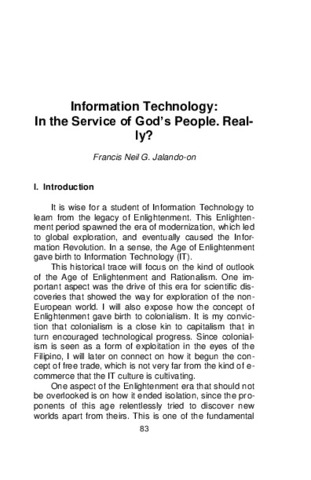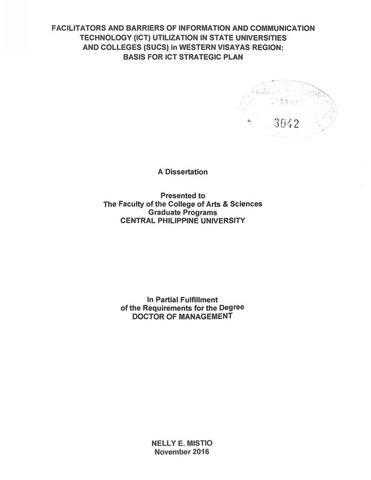Students’ information literacy skills in using e-information resources
| dc.contributor.adviser | Peleña, Ma. Cynthia T. | |
| dc.contributor.author | Japitana, Alysa Jane D. | |
| dc.contributor.author | Macuro, Ma. Quennie A. | |
| dc.contributor.author | Gonzaga, Lyla P. | |
| dc.contributor.author | Castete, Madelyn C. | |
| dc.date.accessioned | 2022-08-31T01:47:48Z | |
| dc.date.available | 2022-08-31T01:47:48Z | |
| dc.date.issued | 2021 | |
| dc.identifier.citation | Japitana, A. J. D. , Macuro, M. Q. A. , Gonzaga, L. P. & Castete, M. C. (2021). Students’ information literacy skills in using e-information resources (Unpublished thesis). Central Philippine University, Jaro, Iloilo City. | en_US |
| dc.identifier.uri | https://hdl.handle.net/20.500.12852/2246 | |
| dc.description | Abstract only | en_US |
| dc.description.abstract | The study aimed at how well respondents could use electronic information resources based on their level of information literacy. When employing electronic resources, the outcomes of this study provided a better foundation for building and expanding students' information literacy skills. A descriptive survey method was utilized in this investigation employing a one-shot survey design. The findings of this survey revealed that more than half of the respondents have a strong literacy competence in using online resources to find relevant information for all of the tool literacy categories. Similarly, people with limited reading abilities have difficulty finding information from different sources. Furthermore, fifty percent of the respondents indicated that strong literacy competence on judging critically if the content on a website is legitimate and true as manifested in all questions under the critical literary section while modest literacy skills are required to evaluate critically if the information collected is credible and relevant. Students' ability to discern whether material on a website is real and truthful also influences their usage of e-resources as reflected in the findings. Meanwhile, the findings show that the capacity to understand when it is appropriate to use the most recent product development in new information technologies is determined by the ability to know when to use the e-information resources. The majority of the respondents had a good literacy skill. Nearly half of the respondents had moderate literacy abilities when it comes to deciding when to accept the constantly developing breakthroughs in information technology. As a result, in order to profit from the growing technology used by libraries, students (users) must be competent. The importance of technological literacy using electronic information resources cannot be possible since technology continues to quickly change people's communication, access, and retrieval of information. | en_US |
| dc.format.extent | xii, 38 leaves | en_US |
| dc.language.iso | en | en_US |
| dc.subject.ddc | Filipiniana Theses 020.72 J271 | en_US |
| dc.subject.lcsh | Electronic information resources | en_US |
| dc.subject.lcsh | College students | en_US |
| dc.subject.lcsh | Electronic information resource literacy | en_US |
| dc.subject.lcsh | Information literacy | en_US |
| dc.subject.lcsh | Electronic information resource literacy--Evaluation | en_US |
| dc.title | Students’ information literacy skills in using e-information resources | en_US |
| dc.type | Thesis | en_US |
| dcterms.accessRights | Not publicly accessible | en_US |
| dc.description.bibliographicalreferences | Includes bibliographical references | en_US |
| dc.contributor.chair | Quijano, Ma. Christina A. | |
| dc.contributor.committeemember | Canson, Rosemarie M. | |
| dc.contributor.committeemember | Delgado, Allana S. | |
| dc.contributor.department | College of Computer Studies | en_US |
| dc.description.degree | Bachelor of Library and Information Science | en_US |





